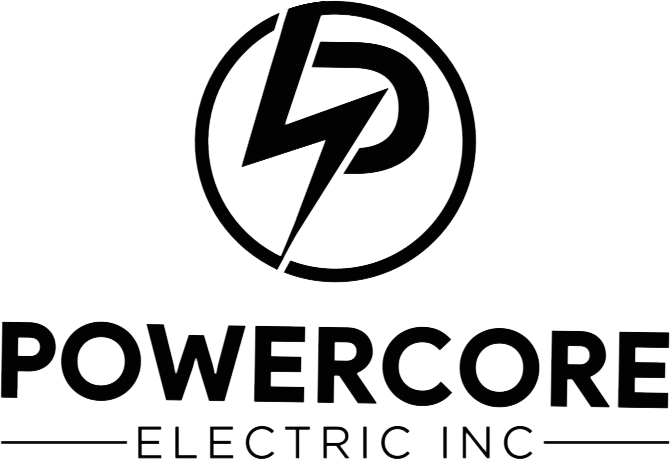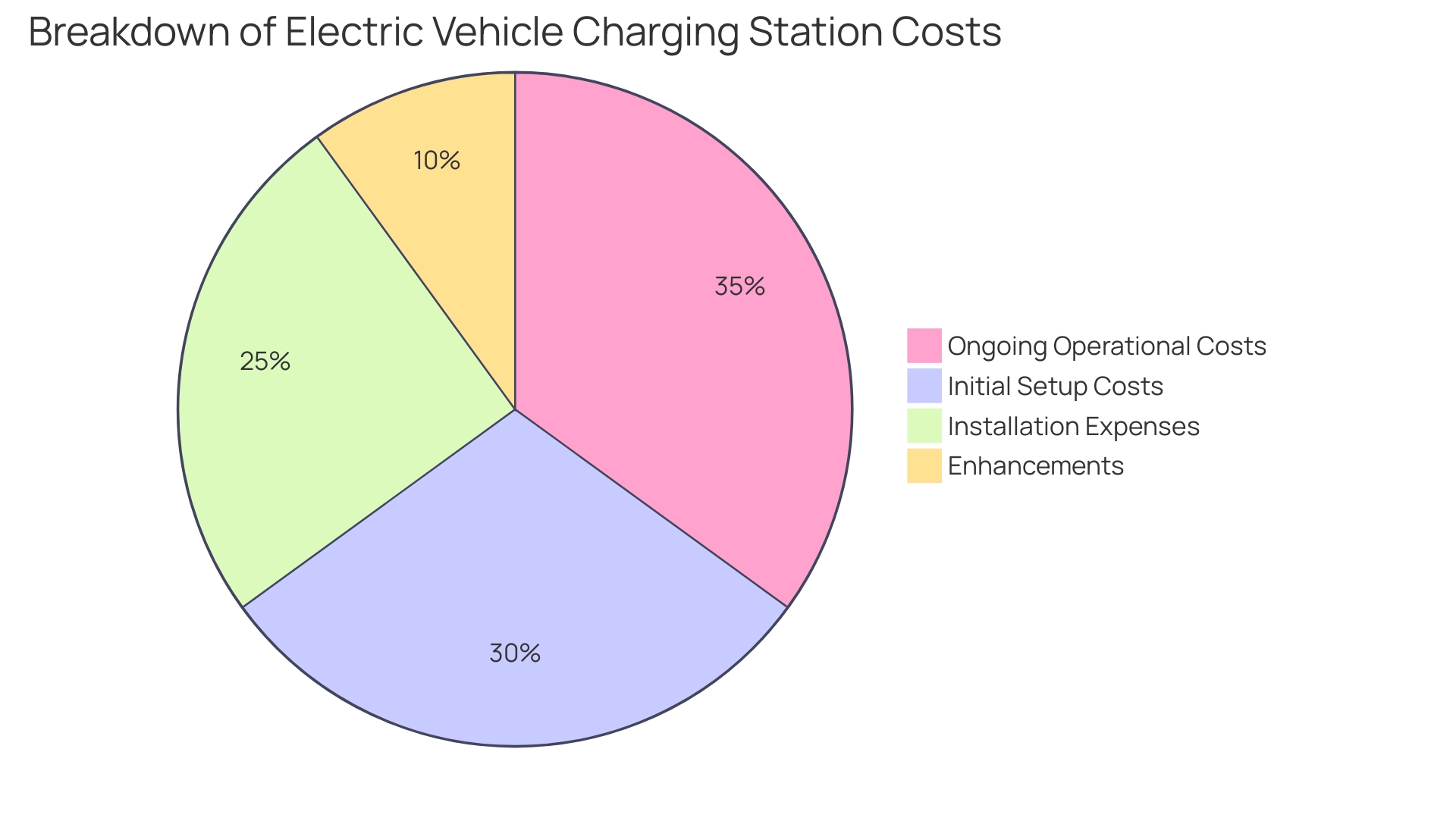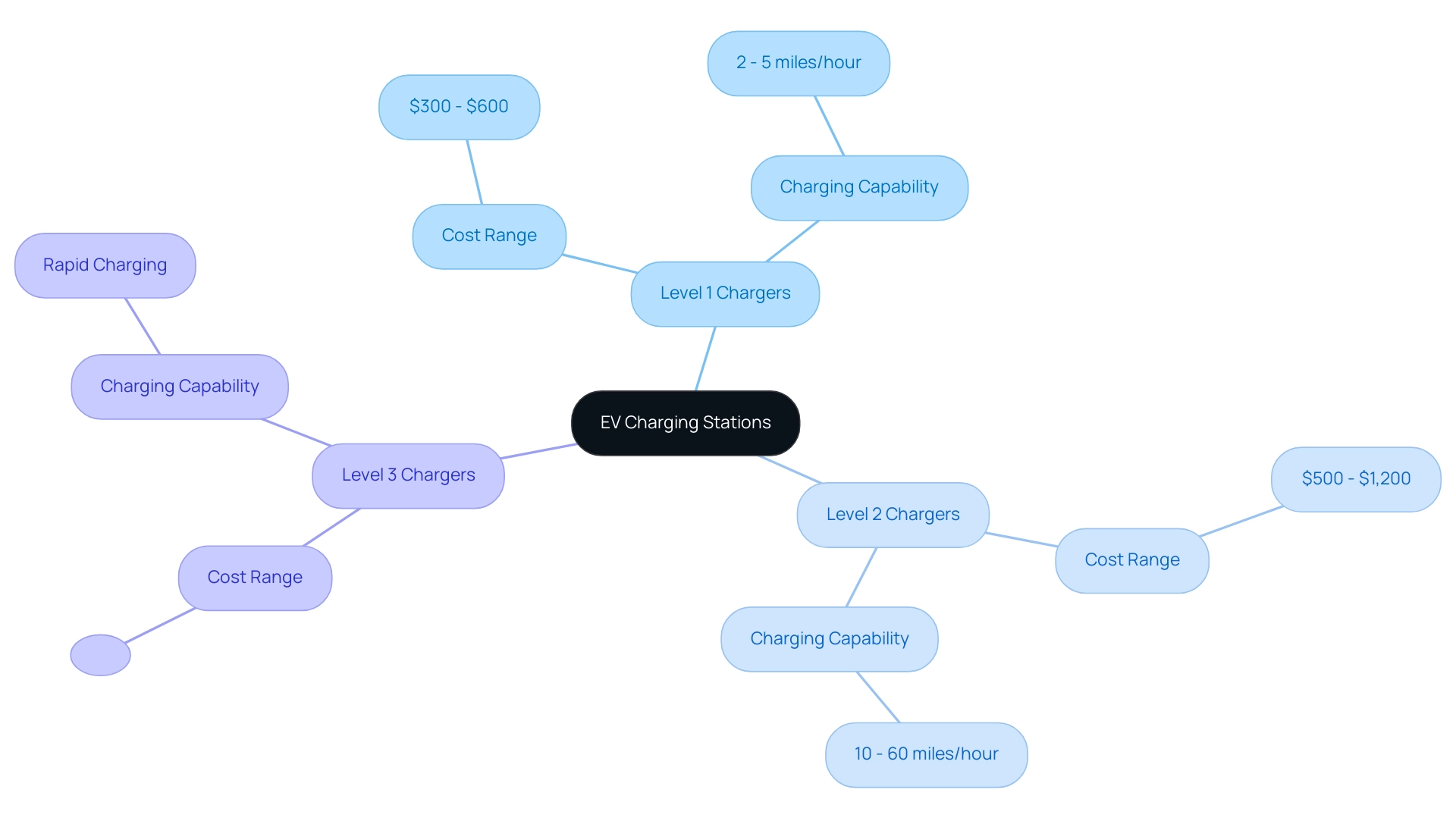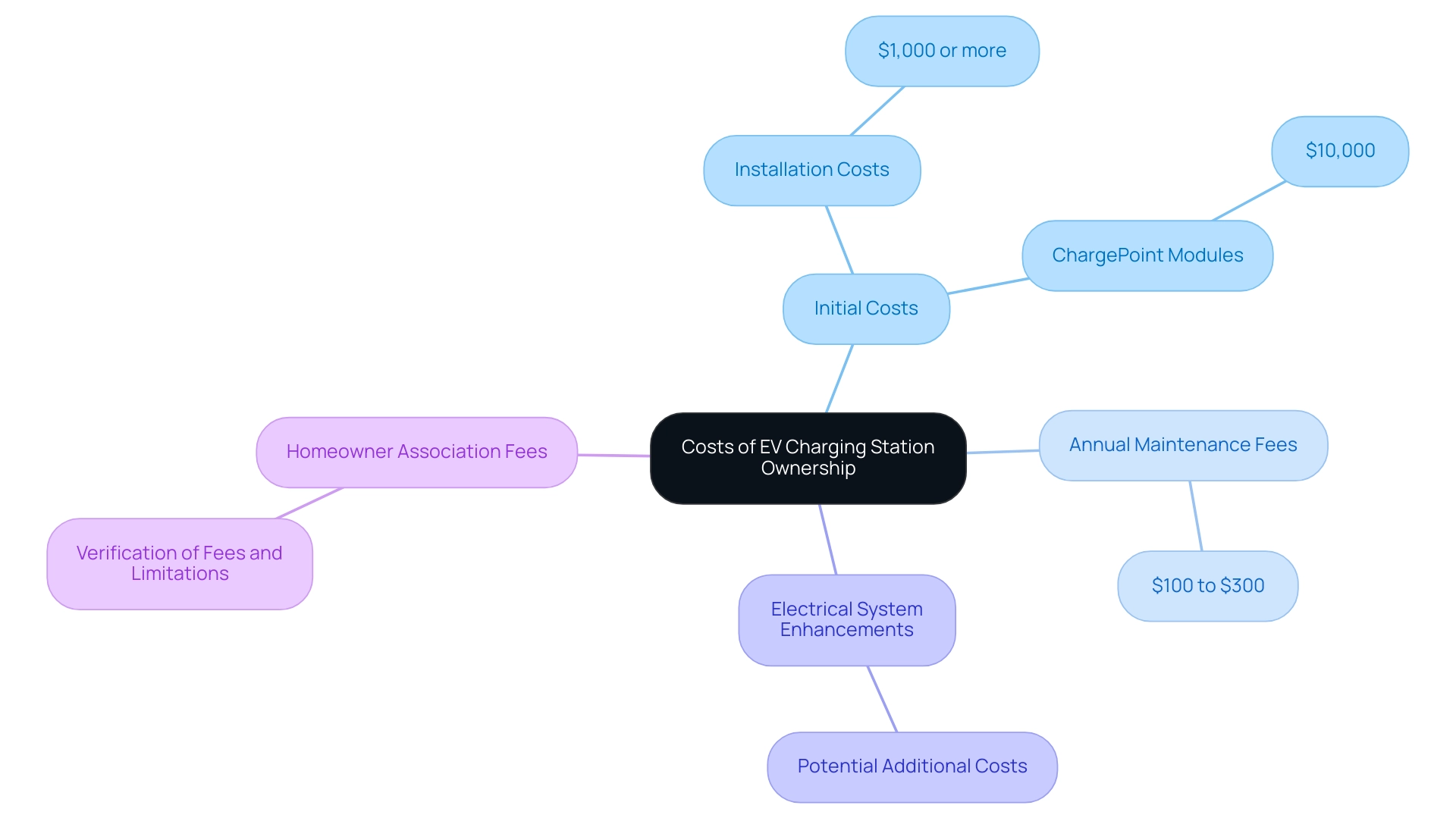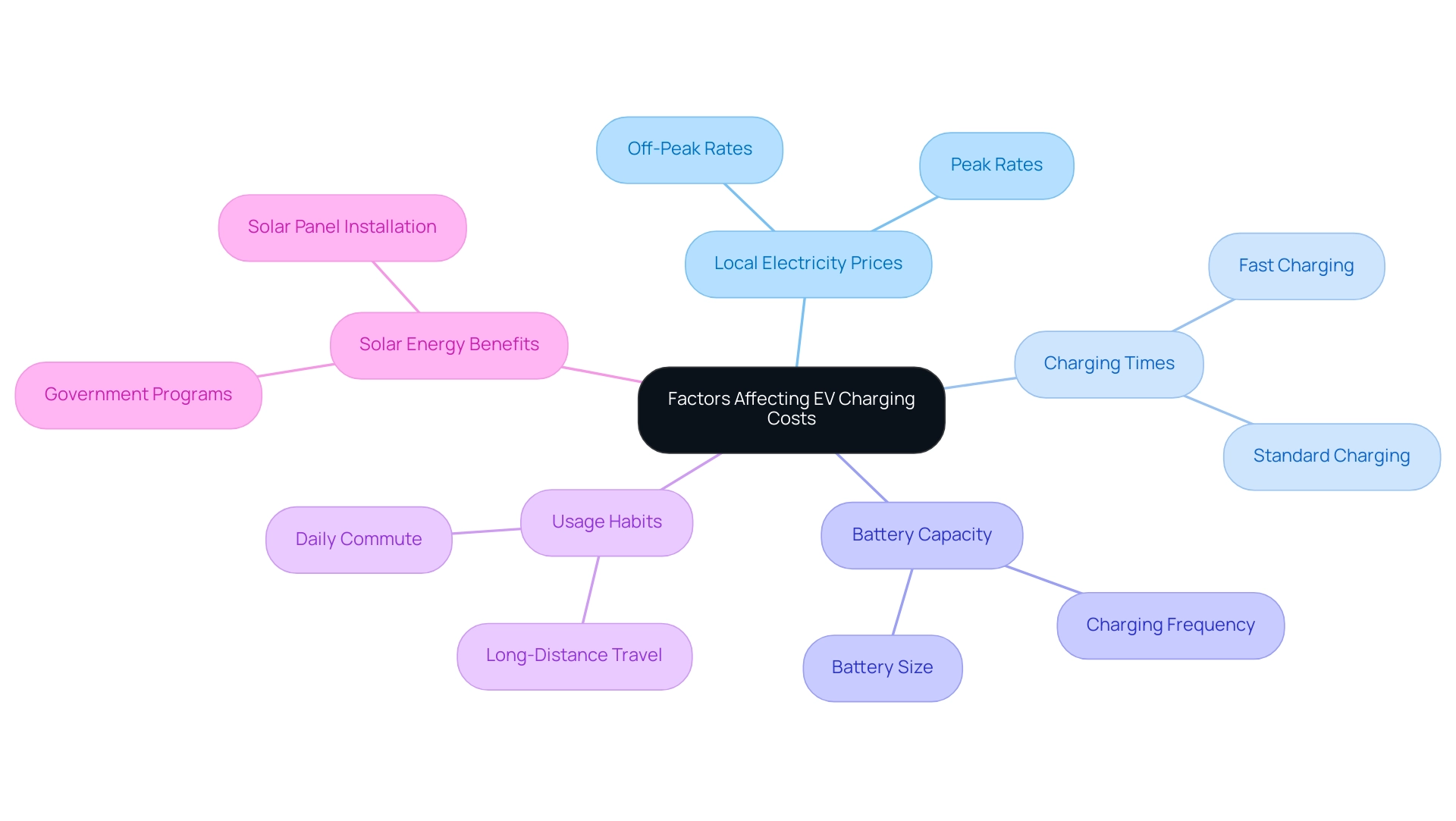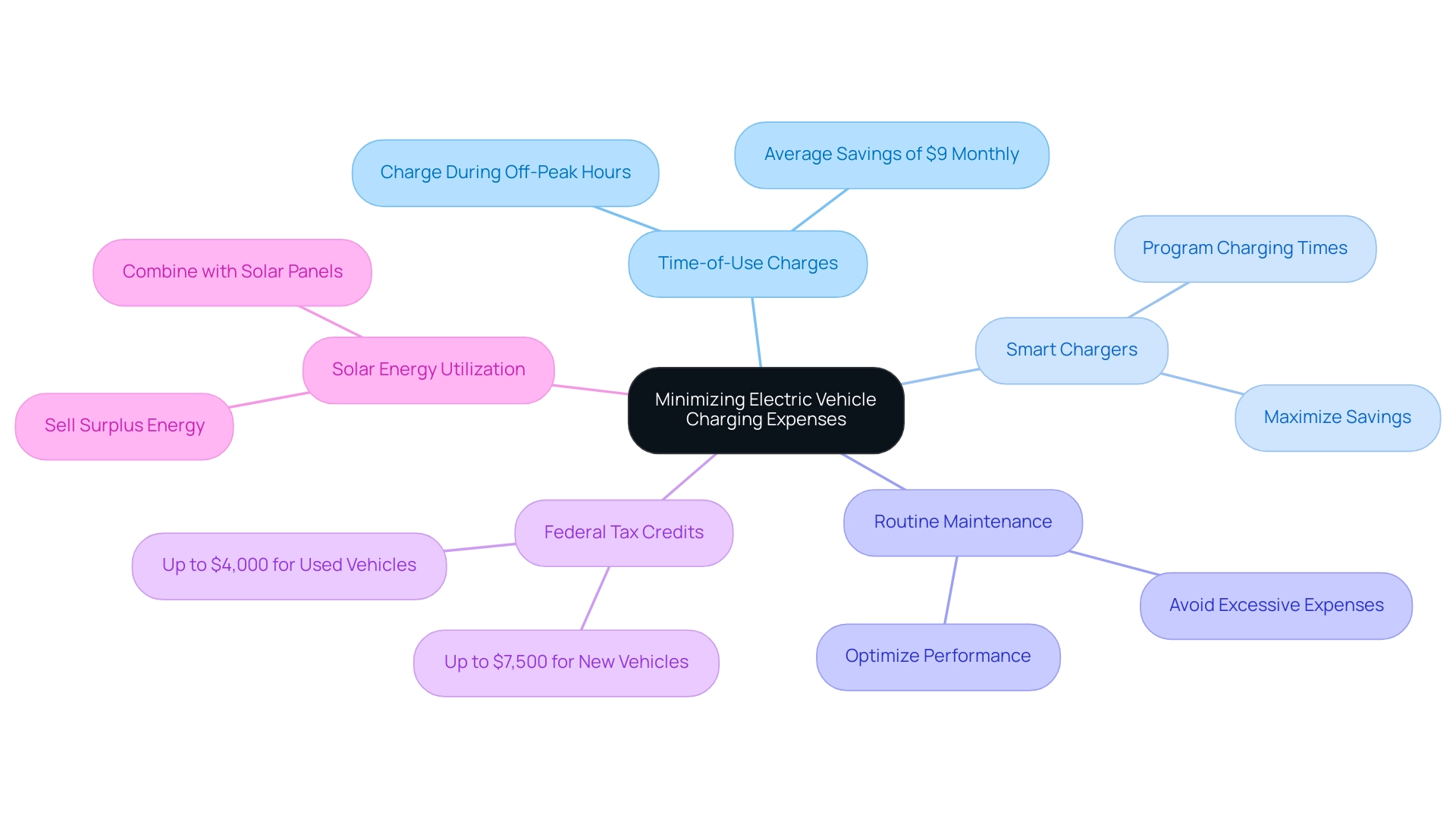Overview
The cost of a charging station for an electric car can range from $300 to over $10,000, depending on the type of charger selected and additional installation requirements. The article supports this by detailing the various types of chargers, their price ranges, and the hidden costs associated with installation and maintenance, helping potential buyers understand the comprehensive financial commitment involved in setting up an EV charging solution.
Introduction
As electric vehicles (EVs) continue to gain popularity, the prospect of installing a charging station at home becomes increasingly appealing. However, the decision extends beyond just the initial installation costs; it encompasses a variety of factors that can significantly impact the overall investment. From understanding the different types of chargers available and their respective price ranges to recognizing hidden costs like maintenance and potential electrical upgrades, navigating this landscape can feel overwhelming.
This article aims to break down the essential elements of EV charging station ownership, offering insights into:
- Ongoing expenses
- Strategies for minimizing costs
- The benefits of integrating solar energy into your charging routine
With the right information, homeowners can make informed decisions that align with their lifestyle and budget, ensuring a smooth transition to a more sustainable way of driving.
Understanding the Total Cost of Electric Vehicle Charging Stations
When you’re evaluating the overall expense of setting up an electric vehicle (EV) power supply at home, it’s essential to consider how much is a charging station for an electric car along with more than just the initial setup fees. Installation expenses can vary depending on the kind of station you choose, the intricacy of the setup, and local labor rates. On average, how much is a charging station for an electric car could have you spending between $500 and $2,500 for setup, depending on these factors.
Qmerit, a reliable partner for EV charger installation, has successfully set up over 450,000 stations, highlighting the increasing need for home EV solutions. But let’s not forget about ongoing operational expenses! The price of electricity plays a significant role here, as it varies according to your local utility rates and how frequently you charge your vehicle.
Recent statistics indicate that the number of slow EV power devices has surged by 13% in 2023, reflecting a growing trend in home EV usage. Furthermore, this rise in usage amounted to an average expense of around 7p per mile driven, a figure that underscores the financial implications of EV ownership. Moreover, investing in power add-ons for your EV charger can enhance its capabilities; for instance, ChargePoint’s 40 kW power modules are available for level 3 chargers, with prices reaching up to $10,000 each, but they significantly improve charging efficiency.
By understanding these costs and potential enhancements, you can better grasp the financial commitment that comes with EV ownership and make informed decisions that suit your lifestyle. For more information on installation and to explore our services, including solar panels and battery backups, contact Powercore Electric Inc. at ryan.serrano@powercoreinc.net or call (916) 699-8778.
Exploring Different Types of EV Charging Stations and Their Costs
When it comes to powering your electric vehicle at home, you’ll primarily encounter two types of EV stations: Level 1 and Level 2. When asking how much is a charging station for an electric car, it’s important to note that Level 1 chargers, which utilize a standard 120-volt outlet, are typically the more budget-friendly option, costing anywhere from $300 to $600. However, keep in mind that they provide a slower power-up rate, usually offering about 2 to 5 miles of range for every hour of replenishment.
On the other hand, when considering how much is a charging station for an electric car, Level 2 chargers require a 240-volt outlet and are generally priced between $500 and $1,200, not including installation costs. The advantage of Level 2 chargers lies in their speed—they can deliver an impressive 10 to 60 miles of range per hour, making them a great choice for those who need quicker turnaround times. Additionally, for homeowners considering more advanced options, they may wonder how much is a charging station for an electric car, as Level 3 chargers are suitable for budgets exceeding $10,000, providing even quicker power delivery capabilities.
Notably, in 2024, ChargePoint will be offering a system that can deliver 500 kW to a single port, showcasing the rapid advancements in EV charging technology. At Powercore Electric Inc., we offer expert setup services for both Level 1 and Level 2 chargers, ensuring you choose the right charger for your lifestyle. Our team is here to help you with the setup process and answer any questions you may have.
To learn more about our services or to arrange a setup, please contact us at ryan.serrano@powercoreinc.net or call (916) 699-8778. Ultimately, your choice should reflect your driving habits and how urgently you need to recharge your vehicle, influenced by the growing government initiatives aimed at promoting EV adoption.
Identifying Hidden Costs in EV Charging Station Ownership
When it comes to owning an EV charging station, many homeowners often overlook how much is a charging station for an electric car, which includes some hidden expenses that can affect their overall investment. In addition to the initial installation and electricity expenses, it’s important to understand how much is a charging station for an electric car, including annual maintenance fees that typically range from $100 to $300. These fees ensure your station operates smoothly and safely over time.
Furthermore, if your residence needs electrical system enhancements to accommodate the new charger, you might be facing installation expenses that raise the question of how much is a charging station for an electric car, potentially adding $1,000 or more to your initial costs. Notably, understanding how much is a charging station for an electric car, such as ChargePoint’s 40 kW power modules for level 3 chargers, can reach up to $10,000, further emphasizing the potential expenses involved. If you are part of a homeowner association (HOA), it’s wise to verify for any extra fees or limitations on setup, as these can differ significantly and influence your plans.
At Powercore Electric, we focus on the setup of EV power sources, ensuring a comprehensive process that includes:
- A thorough site evaluation to determine the best power location
- Necessary electrical upgrades
- Expert setup adhering to all safety and regulatory standards
- Rigorous testing to ensure optimal functionality
Considering these hidden expenses, along with a clear understanding of the installation process, will assist you in budgeting more effectively and avoiding surprises in the future.
Factors Affecting the Cost of Charging Your Electric Vehicle
When evaluating the expenses of charging your electric vehicle (EV) at home, several key factors come into play that can also tie into the benefits of solar energy. Local electricity prices can significantly vary, offering opportunities for savings, especially if you charge during off-peak hours. Many areas offer reduced rates overnight, which can decrease your energy expenses.
Additionally, the speed of your station’s power supply is essential; while quicker replenishment can be convenient, it frequently results in increased electricity consumption, raising costs. Your EV’s battery capacity and how often you need to charge also affect your monthly expenses. Combining these elements will give you a clearer picture of your expenses.
As noted in recent insights, the rise of solar-powered EV replenishment stations in locations like Los Angeles not only highlights the growing infrastructure but also emphasizes the importance of understanding how much is a charging station for an electric car amidst increasing EV adoption. With the number of EVs increasing, having eco-friendly options like solar panels and battery backups from Powercore Electric Inc. can significantly improve your power experience at home. Furthermore, a study titled ‘Investigation of EV Charging Needs’ shows that factors such as age, median income, and car ownership influence EV power needs, which in turn affects your budget.
Additionally, exploring government programs that support solar energy initiatives can provide further financial benefits for homeowners. By understanding how local electricity costs and usage habits affect your finances, you can make informed choices that enhance your environmentally friendly journey! For more information on our services, including solar panels and battery backups, please contact Powercore Electric Inc. at ryan.serrano@powercoreinc.net or call (916) 699-8778.
Tips for Minimizing Your Electric Vehicle Charging Expenses
To manage your electric vehicle charging expenses effectively, it’s important to consider how much is a charging station for an electric car, along with some friendly tips that will make a difference. First up, look into the time-of-use (TOU) charges that many utility companies offer. These prices allow you to charge your EV during off-peak hours when electricity expenses are reduced, saving you an average of over $9 each month.
As Tim Herlitzka, General Manager of Waunakee Utilities, puts it,
We specifically designed this pricing structure not only to help EV users charge their vehicle at a lower cost at night, but also in a way that doesn’t hurt customers who aren’t participating in the three-tier system.
This indicates you can benefit from reduced costs without affecting your neighbors.
Next, consider installing a smart charger.
These nifty devices can be programmed to charge your vehicle at the most economical times, aligning perfectly with those TOU rates. Not only does this maximize your savings, but it also makes powering easy. Maintaining your power station and vehicle well is also essential for optimizing performance.
Routine maintenance can avoid any excessive expenses from ineffective power usage.
Additionally, think about the federal tax credits available for electric vehicles, which include up to $7,500 for new vehicles and up to $4,000 for used ones, subject to income and component restrictions. This financial incentive can significantly reduce the expenses related to how much is a charging station for an electric car ownership.
Lastly, consider utilizing the power of solar energy for your EV refueling. By combining your power setup with solar panels from Powercore Electric, you can significantly reduce your electricity expenses over time, and even sell any surplus energy during peak demand periods. This approach not only boosts your energy independence but also makes your EV power replenishment even more budget-friendly.
So, get ready to charge up and save! If you’re interested in learning more about how Powercore Electric can help you make the switch to a cleaner, more sustainable future with our EV charging solutions, don’t hesitate to contact us at 1514 Adora Circle, Roseville, CA 95678, via email at ryan.serrano@powercoreinc.net, or by phone at (916) 699-8778!
Conclusion
Understanding the total cost of owning an electric vehicle (EV) charging station is essential for making informed decisions. From installation fees that can vary widely based on the type of charger to ongoing expenses like electricity and maintenance, every aspect plays a crucial role in the overall investment. Level 1 and Level 2 chargers offer different benefits and costs, while hidden expenses can catch homeowners off guard if not carefully considered.
Exploring strategies to minimize these costs can lead to significant savings. Utilizing time-of-use rates, investing in smart chargers, and maintaining your equipment are just a few practical steps that can help. Furthermore, integrating solar energy into your charging routine not only boosts sustainability but also enhances cost-effectiveness, making it a win-win for both the environment and your wallet.
Ultimately, the transition to electric vehicle ownership can be both rewarding and economical with the right preparation and knowledge. By taking the time to understand all the factors involved, homeowners can confidently navigate the landscape of EV charging, ensuring a smooth and cost-efficient experience that aligns with their lifestyles and values. Embracing this shift not only contributes to personal savings but also supports a broader movement towards sustainable living.
